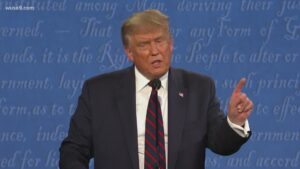
STRATEGIC ASSESSMENT. The United States has spoken out selectively about human rights abuses, focusing primarily on the countries deemed top adversaries by former the Trump administration—Iran, Venezuela, and China. Rather than highlighting the issue of human rights and looking to hold other countries accountable, former U.S. President Donald Trump had been comfortable embraced dictators, even fawning at times over autocrats, publicly supporting authoritarians such as Saudi Crown Prince Muhammad bin Salman, Turkish President Recep Tayyip Erdogan, and Egyptian President. Former Trump’s admiration for ‘strongman rule’ is an anomaly in U.S. policy and offers few incentives for the dictators to alter their odious behavior. All three of these leaders exert effective control over the press, the judiciary, and most popular opposition in the countries they rule. All three reflexively reject criticism of themselves, their policies, or their regimes as treasonous and crack down harshly on even the slightest hint of political dissent.

Since the victory of President-elect Joseph R. Biden, Jr. in the recent U.S. Presidential election, Saudi Arabia, Turkey, and Egypt have cracked down even harder on human rights, likely aware that the future Biden administration will once again highlight human rights abuses. In Saudi Arabia, a country with one of the worst human rights records in the world, the case of Loujain al Hathloul was suddenly transferred to the Specialized Criminal Court last week after a year of no court appearances or decisions. Al-Hathloul was arrested in 2018 just weeks before the much-publicized lifting of the ban on women drivers in Saudi Arabia. She had been a leading voice pushing to lift the ban, but also for more recognition, protection under the law, and safeguarding of human rights in Saudi Arabia, for which she was imprisoned and tortured. In Turkey, a high-profile philanthropist named Osman Kavala has been detained since 2017 on manufactured charges. Kavala appeared to win his freedom when a court found that there was insufficient evidence to hold him and ordered his release. However, rather than release him, the Turkish government fabricated new charges using the preferred tool of the 2016 coup attempt, often manipulated to detain citizens, regime critics, or political opponents. In Egypt, the Sisi government continued its relentless pressure on activists and opposition figures. Three members of the Egyptian Initiative for Personal Rights have been detained in recent weeks, charged under deliberately broad and sufficiently vague terrorism laws, without any evidence.

These moves have not evoked much of a response from the Trump administration, which remains focused on attempting to overturn the results of a free and fair election at home. The White House downplayed international outrage and Congressional pressure when the Saudi government murdered and dismembered U.S.-based journalist and Saudi dissidentn Jamal Khashoggi in October 2018. The Trump administration had remained silent on myriad other abuses by the Kingdom, instead preferring to focus on the transactional aspects of the relationship, including weapons sales from Washington to Riyadh. Meanwhile, Turkey under Erdogan has been growing more austere for years. In Egypt, where President Trump once publicly stated that al-Sisi was his ‘favorite dictator,’ the regime has adopted a variation of the term ‘fake news’ to target human rights activists. An Egyptian court charged Gasser Abdel-Razek, Karim Ennarah, and Mohamed Basheer with ‘using social media accounts to publish false news and information that may harm public peace and security.’ In short, what President Trump might see as realpolitik, dictators and authoritarians view as a green light to continue silencing critics with impunity.


While each of the three governments acted according to their own self-interests, the change in U.S. administrations also likely accelerated some of these recent human rights crackdowns. Even as the United States has failed to live up to its own standards on the promotion and protection of human rights at times, it has also effectively used its position to call attention to and exert pressure upon human rights violators. This ended with the Trump administration, with the president saying very clearly it is not in the U.S. interest to tell other countries how to treat their people. Emphasizing the point, the Trump administration withdrew the U.S. from the United Nations Human Rights Council in 2018. President-Elect Biden has already sent the opposite message, promising to ‘defend the right of activists, political dissidents, and journalists around the world to speak their minds freely without fear of persecution and violence.’ In a clear rebuke to Saudi Arabia, Biden delivered these public remarks on the 2nd anniversary of the murder of Khashoggi. Still, it is more difficult to hold allies accountable once tasked with managing the broader relationship, which includes economics, security, and a range of other factors. The world will be watching closely to see if the Biden administration’s words match its deeds, and whether the incoming President is willing and able to put human rights at the center of U.S. foreign policy. Leaders in Riyadh, Cairo, and Ankara are worried that he will (TSC).





